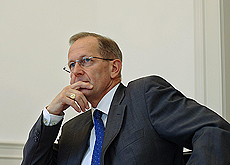
Why Deiss’s resignation wasn’t so unexpected

One word has appeared in every report on Joseph Deiss's resignation: surprise. Political journalist Georges Plomb tells swissinfo why this is an overreaction.
Plomb, a veteran observer of federal politics, puts the economics minister’s decision down to political isolation and consideration of next autumn’s federal elections.
Hardly anyone involved in Swiss politics saw Deiss’s decision coming. Nothing had leaked out prior to his announcement to the media on Thursday morning.
But Plomb, who was a parliamentary correspondent for 35 years and who has published a book on the cabinet, says there are various reasons why Deiss, a member of the centre-right Christian Democratic Party, might have called it a day.
swissinfo: This resignation has surprised many people and could even be considered premature. Seven years isn’t that long for a Swiss minister…
Georges Plomb: It isn’t that long, but it’s not surprising. Since 2003 [when Deiss’s party colleague Ruth Metzler was voted out by parliament in favour of a second seat in the seven-member cabinet for the rightwing Swiss People’s Party, which had become the largest party in parliament] Deiss has been the only Christian Democrat in the cabinet and he has found himself in a more delicate position than previously.
In the old days, the two Christian Democrats could act as an arbitrator between the two centre-left Social Democrats on one side and two centre-right Radicals and one minister from the rightwing Swiss People’s Party on the other. Since 2003 that hasn’t been possible.
There have been times when Deiss hasn’t been able to play this arbitration role on his own and he has occasionally been squeezed out by a right-leaning quartet comprising two Radicals and two ministers from the People’s Party.
Like other people, I’ve noticed a growing fatigue affecting Deiss – that could be one reason for his resignation.
swissinfo: So Deiss could be a victim of this left-right polarisation?
G.P.: Possibly, but there is a slight paradox. The two Social Democrats also find themselves in a minority against the right-leaning quartet, but for some reason they seem to suffer less than Deiss.
That might be because the Social Democratic Party is more solid than the Christian Democratic Party, although there could be other more personal reasons.
But there are also the strategic questions which the Christian Democrats have to ask themselves before the federal elections in 2007.
swissinfo: Did Deiss resign because of the elections?
G.P.: I think they could be a factor, although that is disputed by those closely involved. In [the Bern newspaper] Der Bund yesterday, Iwan Rickenbacher, a former president of the Christian Democrats, said it would boost the party’s chances of success in the elections if Deiss stood down and made way for someone whom the public consider more flamboyant.
swissinfo: It’s not the first time a party has wanted to talk about itself before federal elections. Does this strategy really work?
G.P.: It can work. The Christian Democrats even did it [before the elections] in 1999 and it worked to a certain extent. Despite a definite slump in popularity they managed to keep their two seats in the cabinet – temporarily at least.
We also saw it in 1995 when Otto Stich, a Social Democrat, resigned just before the elections. There too it worked relatively well, as the Social Democrats had a pretty good election.
This strategy can play a role and I think that could also be the case in 2007.
swissinfo: Deiss has often been described as dull, but his stock appears to have risen in recent months.
G.P.: I don’t agree with the negative portrayal of Deiss. He has after all run a pretty good race. It’s true he’s hardly spectacular, but he’s more of an efficient and reliable kind of guy.
Look at his pretty extraordinary achievements regarding foreign policy: there was joining the United Nations in 2002, the bilateral accords with the European Union in 2000 and 2005 and more recently he could even be considered one of the architects of Switzerland’s economic recovery – which admittedly isn’t guaranteed but is looking promising.
swissinfo-interview: Olivier Pauchard
Executive power in Switzerland is vested in the seven-member cabinet. Members are elected, re-elected or – extremely rarely – dismissed by parliament.
Elections for a new legislature are held every four years, and it is not uncommon for cabinet members or ministers to stay in office for ten years or more, although most change portfolios during that time.
The 2003 parliamentary elections upset the so-called “Magic Formula” which dictated the cabinet makeup for more than 40 years.
The success of the Swiss People’s Party at the polls allowed them to claim a second cabinet seat, taking one of the two seats traditionally held by the Christian Democrats.
The Radicals and Social Democrats each hold two of the other four seats.
Joseph Deiss was born in Fribourg in 1946.
The professor of economics was a member of canton Fribourg’s cantonal parliament from 1981-1991.
He also served as mayor of the Fribourg village, Barberêche, from 1982-1996.
He was elected to Switzerland’s House of Representatives in 1991, and was the Swiss price regulator from 1993-1996.
He joined the cabinet in 1999 as foreign minister, and took over the economics portfolio in 2003.

In compliance with the JTI standards
More: SWI swissinfo.ch certified by the Journalism Trust Initiative





























You can find an overview of ongoing debates with our journalists here . Please join us!
If you want to start a conversation about a topic raised in this article or want to report factual errors, email us at english@swissinfo.ch.